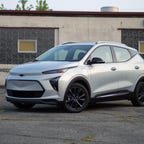
A new car is an expensive investment and they're getting pricier all the time. According to figures collected by Kelley Blue Book in May, the average new vehicle transaction price in the US has climbed to just over $48,000, around 25% more than the May 2023 average.
It's not all doom and gloom, however. Looking more closely at the same data, average new electric vehicle prices are actually down by around $10,000 compared with 2022, settling at around $55,000 on average, thanks to a combination of increased supply and the arrival of more affordable models and trim levels.
That still leaves EVs, on average, more expensive than their fossil-fueled contemporaries, but if you're interested in making the switch to an electric car, there are still plenty of affordable options to choose from -- especially the ones that qualify for state or federal EV tax incentives. To that end, here are the 10 most affordable electric cars you can buy today, ranked by their manufacturer's suggested retail price.
The Chevrolet Bolt EV is the least expensive electric car you can buy in the US today. Even more impressive is that it doesn't cheap out when it comes to range and performance, besting many more expensive electric cars with its 259 miles of cruising range between charges. Charging speed is a touch slow and the Bolt's interior is a bit "economy car," but it's nicely appointed for the money and features smart Android Auto and Apple CarPlay-based dashboard tech. Overall, the Bolt EV is a zero-emissions urban commuter that's easy to live with.
The Bolt and its larger sibling, the Bolt EUV, aren't long for this world, however. Production of the duo is scheduled to end later this year. Get 'em while they're hot.
The Bolt EUV takes everything that's great about the Bolt EV and stretches it across a larger canvas. With more space for passengers and cargo, the EUV is, perhaps, a better fit for young families for not much more money than its smaller sibling. However, the extra girth comes at the cost of a bit of range, dropping to a nevertheless impressive 247 miles per charge. Still, the Bolt EUV is a fantastic value and a great entry point into an EV lifestyle.
For many, the Nissan Leaf was the first electric vehicle that could be taken seriously as an alternative to gasoline-burning commuters. Now deep into its second generation, the Nissan Leaf is still fighting the good fight. In its most affordable configuration, the Leaf S with the 40-kWh battery pack, the electric hatchback offers 149 miles per charge, but paying more for the 212-mile, 60-kWh pack gets you a bit more electric driving wiggle room.
That said, the 13-year-old Leaf is beginning to feel a bit long in the tooth and outclassed by newer competitors with better dashboard and driver aid tech. These days, it's maybe not the best choice for an affordable EV, even if it's one of the least expensive.
The Mini Cooper SE is a specific car built for a specific task. With only 114 miles of range between charges and a fairly slow 50-kilowatt DC fast charging capacity, this isn't the car to pick for long-roving road trips. But for getting around town, the Cooper SE is an unmatched electric runabout with fantastic handling and acceleration at urban speeds, charming interior and exterior design and -- thanks to its compact proportions -- easy maneuverability and parkability.
The Mini Cooper SE shines as a zero-emissions city car, suburban commuter or a first EV for a young driver. Despite its limitations, it's one of our favorite new electric cars.
The unassuming Hyundai Kona Electric sits at what I consider a sweet spot between affordability, utility and practicality in a compact electric commuter. The small SUV cruises up to 258 miles per charge, boasts up to 46.8 cubic feet of cargo capacity with the seats folded and rolls out standard with Hyundai's excellent driver aid and infotainment suite with Android Auto and Apple CarPlay connectivity.
Volkswagen's ID 4 is a midsize electric SUV -- slotting in between the gasoline-powered Taos and Tiguan -- that steps up in scale over the mostly compact and subcompact offerings at the top of this list. The base Standard spec mates a 62kWh battery pack with an electric motor at the rear axle making a modest but torque 201 horsepower. In this configuration, owners can expect around 209 miles of range. Even better is the 275-mile, 82-kWh setup that adds about $5,000 to the bottom line, but also a lot more piece of mind when roaming far from home.
The Niro EV is the often-forgotten front-wheel-drive cousin of Kia's award-winning favorite, the EV6. The Niro boasts solid battery electric performance with a 253-mile cruising range and a peppy 201 horsepower electric motor. Yes, the EV6 is faster with longer range and better efficiency, but only slightly so. Plus, the Niro EV is nearly $10,000 cheaper -- starting at $40,875 for the well-equipped Wind trim level -- with the same great driver aid and infotainment tech as its more expensive cousin.
And if you're not ready to go full EV, the Niro is also available in electrified hybrid and plug-in hybrid variants as well.
Tesla has been shaking things up with its Model 3, adjusting the MSRP seemingly on a monthly basis. The electric sedan is currently as affordable as it's ever been, starting at $41,630 including destination charges. That's before you factor in the $7,500 federal EV tax credit it recently requalified for, along with any state incentives. With its excellent performance and 272 miles of range for the base model (the most of any EV on this list), the Tesla Model 3 is a formidable option for EV enthusiasts on a budget.
Hyundai's followup to the sharply styled Ioniq 5 is, of course, the Ioniq 6. Smaller in scale and capacity than its big brother, the 5 wraps flowing geometric curves around compact sedan proportions and one of the most aerodynamic profiles on the road. Inside, the sedan's cabin feels a bit more spartan than the Ioniq 5 crossover, but still wows with smart details and clever use of space.
At the $42,715 entry point for the rear-driven Standard Range model, the Ioniq 6 promises up to 240 miles of range per charge, which mates well with its ultrafast charging. At a 350-kW DC fast charging station, owners can zip from 10% to 80% charge in as little as 18 minutes.
Beneath its crisp, geometric lines and more upright compact crossover proportions, Hyundai's Ioniq 5 features the same excellent electric vehicle platform, powertrain and battery pack as the smaller the Ioniq 6. The two EVs are nearly evenly matched on price -- at $42,785 to start, the 5 is only $70 more expensive -- but the larger 220-mile Ioniq 5 SE Standard Range trades a bit of range for more space for passengers and cargo making it a slightly better fit for small families.
Do EVs cost more than gasoline cars?
Compared to their gasoline-powered counterparts of similar size and equipment, yes, electric vehicles are usually more expensive. Electric powertrains are mechanically less complex than a combustion engine and gearbox, but the large batteries that EVs use are often constructed using rare materials which drives up manufacturing costs (and sticker prices) up.
Viewed by consumers and manufacturers as high-tech items, the current generation of electric vehicles also usually roll out with a high level of equipment, connectivity and technology as standard equipment, which again causes the base price to swell. (Higher prices for first-generation models also helps automaker's recoup the high development costs and factory retooling, which is why many EVs launch with fully loaded first-edition models aimed at early adopters before trickling out lower cost trim levels later.)
However, as EV manufacturing continues to scale up, automakers are constantly seeking new ways to reduce the cost of materials and production. Some are looking into motors that use less or no rare earth materials while others are investing in new battery technology and solid state energy storage. Meanwhile, we're also starting to see more budget friendly, entry-level EVs like the upcoming Volvo EX30 poised to enter the market in the coming months.
Are EVs cheaper to operate than combustion cars?
With few moving parts and much lower thermal needs, electric powertrains are generally low- or no-maintenance machines. That saves you money over the long term on oil changes, coolant, air filters, brakes and other routine service items.
Electric cars are also usually more efficient than gasoline cars, wasting less energy (fuel) to heat to travel a given distance. How much you can expect to pay per kilowatt will vary depending on where you live, but generally electricity is less expensive than gasoline. This is especially true if you charge at home during off-peak twilight hours.
Long-term reliability is also a key concern when choosing an affordable electric car. True, EVs are less expensive to maintain, but with more expensive components under the hood, they are often more expensive to repair if things do go wrong. This can lead to more expensive insurance costs and higher unexpected repair bills.
What to look for or avoid in an affordable electric car?
The first thing you'll want to consider is what affordable EVs deliver the range you'll need to get where you need to go. Lower cost electric cars tend to have smaller batteries and modest range. I wouldn't say outright steer clear of the lower end of the range spectrum -- 100- to 150-mile EVs like the Mini Cooper SE still serve an important niche in tight, urban environments -- but most drivers would be most comfortable in the flexible 200- to 250-mile range.
Affordable electric cars (at or below around $40,000) tend to be compact or subcompact in scale, so finding a model that physically fits your needs with the right amount of interior volume is also important. And remember, looks can be deceiving. Purpose-built EVs, like the VW ID 4 or Hyundai Ioniq 5, often have the advantage of longer wheelbases and more spacious cabins than gasoline-driven counterparts of similar overall length.









 Add Category
Add Category


